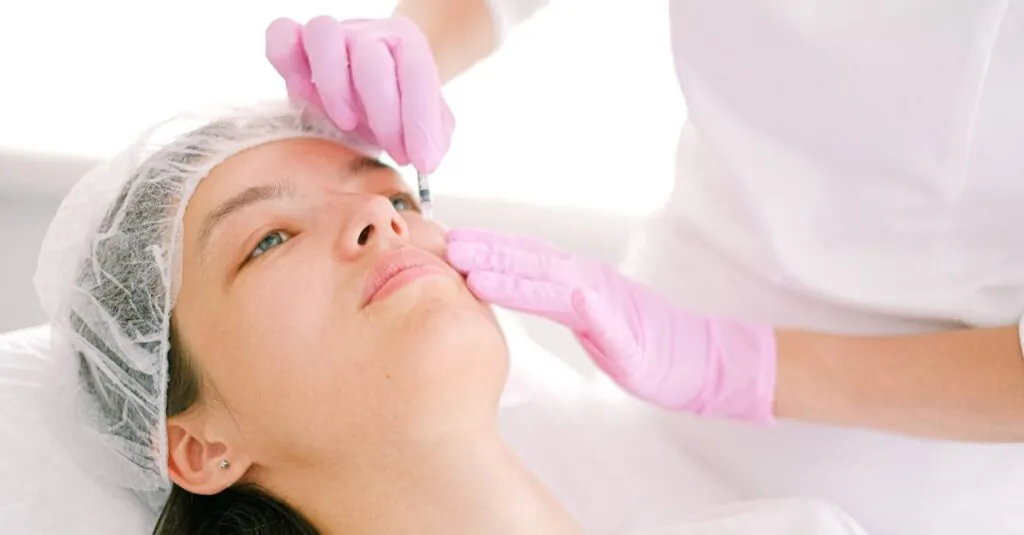Table of Contents
ToggleHyaluronic acid might sound like a fancy potion brewed in a wizard’s lab, but it’s actually a superstar ingredient in the world of skincare and wellness. This magical molecule has the incredible ability to hold up to 1,000 times its weight in water, making it the ultimate hydration hero for anyone looking to quench their skin’s thirst.
Overview of Hyaluronic Acid
Hyaluronic acid functions as a naturally occurring substance in the human body. Found in connective tissues, skin, and cartilage, it plays a crucial role in maintaining skin hydration. This substance can hold up to 1,000 times its weight in water, making it a leading ingredient in many skincare products.
Applications of hyaluronic acid extend beyond skincare. It serves as a vital component in dermal fillers, enhancing volume and reducing wrinkles in cosmetic procedures. Many medical professionals use it to treat osteoarthritis by injecting it directly into joints. These treatments improve joint mobility and alleviate pain.
Different forms of hyaluronic acid exist, including low molecular weight and high molecular weight variants. Low molecular weight hyaluronic acid penetrates deeper into the skin, providing intense hydration. Meanwhile, high molecular weight hyaluronic acid remains on the surface, creating a protective barrier that locks in moisture.
Cosmetic manufacturers often incorporate this ingredient into serums, creams, and masks, attracting consumers seeking hydration and wrinkle reduction. Regular usage can lead to smoother, plumper skin, and significant elasticity improvement.
In addition to its cosmetic benefits, hyaluronic acid supports wound healing. Studies indicate it aids in tissue regeneration, demonstrating effectiveness in healing burns and skin lesions. Overall, its multifaceted properties make hyaluronic acid a vital asset in both skincare and medical applications.
Common Hyaluronic Acid Uses
Hyaluronic acid serves various purposes in skincare and medical applications. Its unique properties address hydration and alleviate discomfort.
Skincare Benefits
Hyaluronic acid enhances skin hydration significantly. Many facial serums and creams contain this ingredient for its ability to retain moisture and improve elasticity. Users experience plumper skin and reduced fine lines after consistent application. Products rich in this acid can penetrate deeper layers, providing intense hydration. Additionally, they help maintain a protective barrier on the skin’s surface. Regular incorporation into daily routines leads to visibly smoother skin. Professionals recommend including hyaluronic acid in skincare regimens for maximum hydration.
Joint Health Support
Hyaluronic acid plays a crucial role in joint health. Clinicians often use it in treatments for osteoarthritis to reduce joint pain and improve mobility. Injections of hyaluronic acid into affected joints can provide significant relief. These injections enhance the lubrication of joints, allowing for smoother movement. Many individuals report improved comfort during activities following treatment. Studies indicate that hyaluronic acid can slow down the degeneration of cartilage and promote joint function. Utilizing hyaluronic acid in this manner demonstrates its importance in overall joint wellness.
Hyaluronic Acid in Medical Treatments
Hyaluronic acid serves multiple purposes in medical treatments, particularly in eye surgeries and wound healing.
Eye Surgeries
Surgeons utilize hyaluronic acid as a viscoelastic agent during ophthalmic procedures. It enhances surgical visibility and maintains eye shape. Patients undergoing cataract or corneal surgeries benefit from its protective properties. The substance reduces friction between instruments and delicate tissues, minimizing trauma. According to research, its application in eye surgeries leads to fewer complications and faster recovery times.
Wound Healing
Hyaluronic acid plays a significant role in promoting wound healing. It encourages tissue regeneration and effectively reduces inflammation. The substance aids in attracting moisture to the site of injury, creating an optimal healing environment. Skin lesions and burns particularly see improved recovery rates with hyaluronic acid application. Studies show that its use in wound care accelerates healing and minimizes scarring while enhancing overall skin appearance.
Hyaluronic Acid in Cosmetics
Hyaluronic acid plays a pivotal role in modern cosmetics, notably in dermal fillers and injection treatments. This powerful ingredient enhances facial volume while reducing the appearance of fine lines and wrinkles.
Fillers and Injection Treatments
Dermal fillers contain hyaluronic acid to replenish lost volume and create a smoother skin texture. Commonly, these fillers target areas such as the cheeks, lips, and nasolabial folds. Many cosmetic procedures utilize hyaluronic acid injections due to its safety profile and temporary effects. Patients experience minimal discomfort during treatments, as this substance integrates naturally into the skin. Results typically last between six and twelve months, depending on the specific product and individual metabolism. Various brands offer unique formulations, ensuring a tailored approach to client needs. Moreover, professionals often recommend combining hyaluronic acid treatments with skincare regimens for optimal results. Smoother, hydrated skin leads to an overall more youthful appearance, making hyaluronic acid indispensable in cosmetic applications.
Hyaluronic acid stands out as a versatile ingredient with significant benefits in skincare and medical applications. Its ability to retain moisture makes it essential for hydration and skin elasticity. Beyond cosmetics, it plays a crucial role in joint health by alleviating osteoarthritis symptoms and enhancing mobility.
As professionals continue to explore its uses, the impact of hyaluronic acid in treatments like dermal fillers and wound healing becomes increasingly evident. Incorporating this powerful substance into daily routines can lead to smoother skin and improved overall wellness. With its proven effectiveness and safety, hyaluronic acid remains a go-to solution for those seeking both beauty and health benefits.




